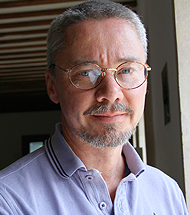"Religion must be present in the public sphere because it enriches the discussions that take place in it"
Joris van Eijnatten, professor at the University of Utrecht, participated in an ICS international conference on religious tolerance

At the University of Navarra, Joris van Eijnatten, professor at the University of Utrecht (Netherlands), argued that, to promote tolerance, people must have the freedom to profess a religion and not be forced to relegate it to the private sphere. "Religion must be present in the public sphere because it enriches the discussions that take place in it," he noted.
The expert was speaking at a conference on Religious Toleration in the Age of Enlightenment (1650-1800): Historical Perspectives on Current Debates organized by the Religion and Civil Society project of the Institute for Culture and Society (ICS). The title of his lecture was "Religion, Toleration and the Enlightenment: The Dutch case."
For Joris van Eijnatten, in the eighteenth century, "religious tolerance existed simply to avoid conflicts between people… The situation has changed completely because we now live in constitutional states where there are laws governing these issues."
Professor Eijnatten insisted that, "we must reinvent and rethink toleration because times have changed" and "we must live it, not just theorize about it." In this regard, he argued that, "to live in the modern world means living toleration."
Regarding the influence of the Enlightenment, Joris van Eijnatten said that one of the main research themes points to this period as a time of "glorification" of universal rights, which were imposed on society.
For him, this is somewhat controversial because, during that historic stage, freedom was somewhat "imposed" on people, which, among other things, meant that people were meant to "free themselves" of religion and confine it to the private sphere.
Religious toleration for conflict prevention"Muslim immigrants in European countries saw this as a problem, as Joris van Eijnatten explained, because they were not used to this debate that the Enlightenment introduced."
Joris van Eijnatten was one of the conference participants, all of whom came from universities in Bulgaria, Chile, the United States, Spain, Hungary, the Netherlands and the United Kingdom. They presented topics related to religious peace, religious violence, the development of a tolerant mentality and Islam, among other topics.
The conference focused on two main themes. The first consisted in tracing the many legacies of the Enlightenment present in dominant discourses on religion and freedom. The second consisted in reconsidering existing narrations on the Enlightenment's place in the history of toleration. This approach aims to more critically examine the assumptions that underlie recent debates on religious freedom and contribute to a more rigorous and honest dialogue on this issue.
El proyecto ‘Religión y sociedad civil’ del Instituto Cultura y Sociedad (ICS) organizó el congreso ‘Religious...
Posted by ICS Unav on Jueves, 25 de junio de 2015
